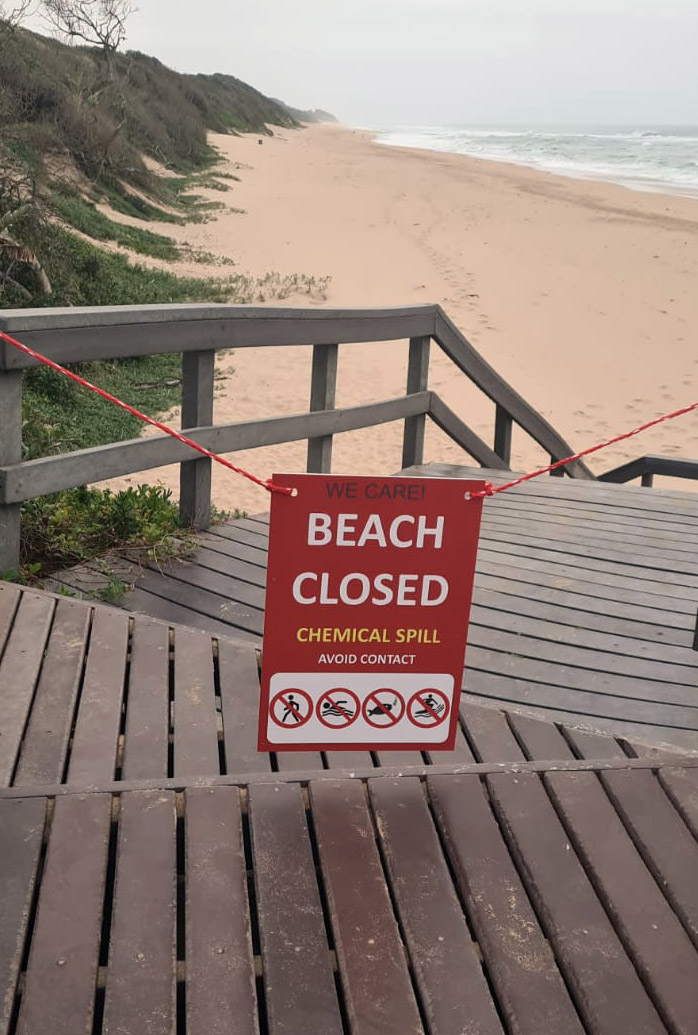India’s UPL agrochemicals group has ramped up the pressure on the eThekwini Municipality to reopen beaches north of Durban following the massive spill of toxic chemicals into the sea 11 weeks ago, asserting in a media statement yesterday that “experts have given the all-clear” for beaches to reopen.
But barely four hours later, the city refused to lift the ban at UPL’s behest – and extended the ban instead to also cover the central beaches due to high levels of human sewage contamination found in the sea off Durban’s Golden Mile ahead of the Heritage Day long weekend.
This means that all Durban’s central and northern tourist beaches are closed for swimming until further notice due to the combined effects of chemical and sewage pollution. The only beaches still open are those south of Durban harbour.
Laboratory test results seen by Our Burning Planet reveal the highest levels of E.coli (sewage pollution) of nearly 8,000 cfu/100ml of seawater in the vicinity of Battery Beach.
The latest sewage leak, blamed by the city on a malfunctioning sewer pump station that is “constantly vandalised for scrap metals”, has thrown another spanner in the works for Durban’s beleaguered beach-based tourism industry and also provided an opening for the UPL agrochemicals group to divert attention from its culpability for toxic chemical pollution of the sea and to cast itself as a victim.

Ethekwini Municipality has closed roughly 40km of beaches in Durban in reaction to the spill. There is fierce debate, even among UPL’s experts, about whether it is safe to open beaches. (Supplied: Nicole Bollman)
The company’s South African subsidiary is already facing criminal charges laid by the government and a R177-million (and counting) clean-up bill for private contractors to decontaminate land and rivers near its chemical warehouse at Cornubia, which burnt to the ground after an arson attack on July 12.
In light of complaints by members of the hospitality business that beach closures are leading to lower bookings or cancellations at popular tourist resorts around Umhlanga and Umdloti, it remains unclear whether UPL will face further damages claims for lost revenue from the hospitality sector. UPL states that it has not received any formal damages claims from the industry.
On September 23, UPL issued a media statement saying it had provided a report to the city “written by independent specialists”, recommending that all beaches were safe to be reopened (with the exception of a 1km- wide exclusion zone around the mouth of the Umhlanga lagoon).
The City, however, has refused to budge on reopening the northern beaches for now, citing “inadequate submissions” from UPL and the need for an independent scientific peer-review of reports provided by UPL consultants.
“The city is aware of the significance of this long weekend, but it has a responsibility of guarding against anything that poses a threat to the public and tourists,” the City said.
“At this point in time, eThekwini is awaiting the final and signed-off report from UPL’s specialists. This requirement came out of a workshop with UPL and their specialists on 8 September 2021. The submissions received prior to this workshop were inadequate. They did not reference the spill or site in question and were riddled with errors about the concentrations of toxins. In some cases, the submissions were unsigned and as a result they were unacceptable and rejected on that basis. A consolidated report is expected early next week after which an independent peer review process will take place.
“The final report on beach opening will be made available to the public at the same time it is sent for peer review. The public are asked to be patient and comply with requests from authorities. Any inconvenience is regretted; however, the safety of the public is of utmost importance.”
Our Burning Planet has also asked UPL for a copy of its consultant’s report prepared for the city – along with a full list of chemicals tested in the beach sand and ocean.
UPL South Africa commercial director Jan Botha said that several samples had been collected from various sites between Salt Rock in the north to the Umgeni estuary in the south, “with the results undergoing expert scrutiny and interpretation by a range of independent specialists”.
“They have concluded that the beaches and ocean outside a 1km exclusion zone, north, south and east of the mouth pose an extremely low chemical risk to the public regardless of whether the (Umhlanga) estuary mouth is open or closed.”
Nevertheless, the river mouth is currently open to the sea following recent heavy rains, increasing the risk of further chemical poisons being flushed into the sea from the heavily-contaminated river sediments.
Several community representatives have voiced concern about the independence of the pollution investigation process, as the overwhelming majority of expert consultants are commissioned and paid directly by UPL – rather than being appointed independently by the government and paid at arms’ length by the polluting company.
Botha however, said: “What has been lost in much of the discussion on this incident is that UPL was a victim as much as any other business that was the target of violent destruction [during the July insurrection].”
But this statement ignores the fact that no environmental impact assessment was done for the UPL toxic chemicals warehouse – which also appears to have lacked the most rudimentary measures to contain a major spillage of chemicals into adjacent rivers and the ocean in the event of a major calamity such as a fire, flood or sabotage attack on a facility containing thousands of tons of farm chemicals and pesticides.
We asked Botha to provide details of safety measures in place, such as bunding, to trap chemicals from spilling into the environment. (Bunds, similar to empty castle moats, can trap pollution on site and are a common feature around major fuel refineries).
We also asked for a copy of the full report from UPL consultants on the chemical tests on sea water and beach sand north of Durban; the names of the experts it consulted, and the range of chemicals tested.
In response, UPL said late on Thursday, 23 September, that: “The report was compiled by Mr Sean Chester of Apex Environmental, based on specialist reports by toxicologists Dr Gerhard Verdoorn and Prof Mary Gulumian; and coastal specialist Mrs Nicky Forbes of MER.”
It refused to provide a copy of the report, stating that: “For clarity, the submission of the final report will only take place this evening. The draft report has already been submitted, and following comments from the authorities, amendments have been effected to the final report. The report cannot be released to the public at this stage, because it is a report prepared for the City, and is still under consideration. However, it recommends that except for recreational and harvesting exclusion zones in the vicinity of the estuary mouth, the beaches can return to normal. That is UPL’s position, as it has been for some weeks, but only the City can make that decision.”
On why it regarded itself as a “victim” and whether it could explain whether the warehouse it leased was equipped with bunding or any other toxic pollution containment measures in the event of a flood, fire, earthquake, act of sabotage, terrorism etc, the company said:
“This question is not related to the report or the issues pertaining to the accessibility of the North Coast beaches and UPL therefore declines to answer this question at this stage, but will continue to provide updates in the future.” DM/OBP





















 Become an Insider
Become an Insider
Comparison of similar storage facility in first world country to see their environmental safety installations will immediately highlight deception or not of UPL in ducking out of every safety cost in the name of profit. Are there responsible engineers at UPL South Africa. Your heads should be hung in shame.
Based on what we know thus far, all the directors of this delinquent company should be prosecuted.
The businesses in Umhlanga and the north coast region relying on income normally generated on a long weekend at the beginning of summer have yet another reason to claim against UPL – compensation for potential lost revenue might well be the next challenge. No wonder UPL is arguing for the city to open beaches as if things were normal! And no wonder the city has discovered a dangerous “sewage leak” knowing that things are not normal and not wanting to be partially blamed should futher toxic complications arise from the original UPL poisoning of the environments. The blame game and responsibility sharing continues….
Bhopal: It was too dangerous for the parent company to produce the chemicals in their own country.
The malfunctioning sewer pumps have been a problem for ages now and apparently the problem is largely related to a lack of routine maintenance and budgetary constraints. A similar problem exists with the swimming pools where millions have been squandered on useless service providers. It’s said that if this problem continues Durban’s beaches will be permanently closed within the next 5 years thereby shutting down Durban’s hospitality industry. Another failure of the ANC lead eThekwini Municipality
Unbelievable. Class Action Law Suit. They deserve to be liquidated over this.